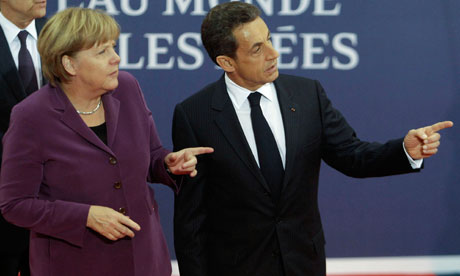In May The Dismal Political Economist wrote the following
European Economic Community Planning to Commit Non-Fatal Suicide over Greece
Non-Fatal Suicide (def): A set of actions, policy decisions, strategies and positions taken by a business, regulatory agency or government which are so self-destructive that they would cause the demise of a lesser organization, but only inflicts huge but non-fatal harm to an organization that is strong enough to withstand the self-destructive behavior
It was clear at that time that
The European Community ,seems determined to take a series of steps, which if fully implemented would lead to severe destruction of the value of that entity. If current policy is carried out it could well earn a chapter of its own if Barbara Tuchman ever updates her classic work on the self destructive actions of nations, The March of Folly.
As things got worse the hope was that Europe would recognize its policy was doing far more damage than good, and that unless it was changed the European economy was headed for disaster. It now appears that disaster is approaching.
The European leaders met their international counterparts amid signs that a new recession is now stalking the eurozone – blamed in part on the sovereign debt crisis. A report showed factories in the 17-nation euro area suffered their sharpest decline in output in two years.
And this
Leaders were presented with evidence that the uncertainty about the euro is having a knock-on effect on the economy. A gloomy manufacturing report – known as Markit manufacturing purchasers' index – showed activity among eurozone manufacturers fell for the third month running and at its fastest pace for more than two years. "If there was any doubt that the eurozone was headed for recession, these data should confirm it," said Alan Clarke, eurozone economist at Scotia Capital.
And this
China's deputy finance minister, Zhu Guangyao, speaking in Cannes , said Beijing China
Here is what Mr. Sarkozy of France and Ms. Merkel of Germany who are the leaders in Europe these days are saying.
 |
Nicolas Sarkozy and Angela Merkel will be pointing the finger at Greece to deliver a yes vote in its referendum after pre-summit talks with George Papandreou. Photograph: Michel Euler/AP |
Angela Merkel, and French president, Nicolas Sarkozy, were holding make-or-break talks with Papandreou. Greece was warned it will not be handed €8bn (£6.9bn) of bailout money due this month unless there is a swift yes vote in the referendum.
So if Greece does hold its referendum and if they do not approve the new program that will further reduce income, employment and economic activity, and increase taxes, then Europe will allow them to default. Default will cause a trigger on insurance of Greek debt, insurance which may not be able to be paid causing a failure of those institutions who provided insurance, and a possible failure of European banks. Unless of course Europe goes ahead and provides Greece
Waiting in the wings is Italy
The Italians, whose borrowing costs are regarded as being prohibitively high at over 6%, are under pressure to demonstrate their commitment to reform. Silvio Berlusconi's cabinet was meeting on Wednesday to ensure he did not turn up in Cannes
As for the United State
Ben Bernanke, the Federal Reserve chairman, also admitted the eurozone crisis was hurting the US
But Mr. Bernanke is wrong. This is not “bad luck”. This is the fruition of the policy of a Confederacy of Idiots. Look, as readers of this Forum will have long ago noted, The Dismal Political Economist is not a policy expert and denizen of the highest academic and policy making circles. If he can have seen this result six months ago so should those who are the denizens of high academic and policy circles.
Is there any upside? Yes, this impending crisis may force Europe into a cohesive policy that will prevent the worst from happening. If not, their failure to do so will doom millions to misery that could have been avoided.
Remember, it is not always darkest before the dawn, it is usually darkest before things go completely black.



No comments:
Post a Comment